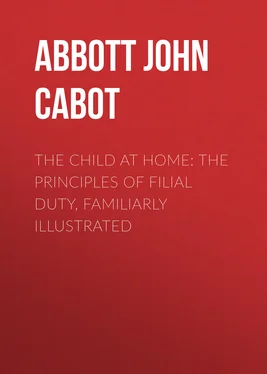John Abbott - The Child at Home - The Principles of Filial Duty, Familiarly Illustrated
Здесь есть возможность читать онлайн «John Abbott - The Child at Home - The Principles of Filial Duty, Familiarly Illustrated» — ознакомительный отрывок электронной книги совершенно бесплатно, а после прочтения отрывка купить полную версию. В некоторых случаях можно слушать аудио, скачать через торрент в формате fb2 и присутствует краткое содержание. Жанр: foreign_prose, foreign_edu, foreign_antique, на английском языке. Описание произведения, (предисловие) а так же отзывы посетителей доступны на портале библиотеки ЛибКат.
- Название:The Child at Home: The Principles of Filial Duty, Familiarly Illustrated
- Автор:
- Жанр:
- Год:неизвестен
- ISBN:нет данных
- Рейтинг книги:4 / 5. Голосов: 1
-
Избранное:Добавить в избранное
- Отзывы:
-
Ваша оценка:
- 80
- 1
- 2
- 3
- 4
- 5
The Child at Home: The Principles of Filial Duty, Familiarly Illustrated: краткое содержание, описание и аннотация
Предлагаем к чтению аннотацию, описание, краткое содержание или предисловие (зависит от того, что написал сам автор книги «The Child at Home: The Principles of Filial Duty, Familiarly Illustrated»). Если вы не нашли необходимую информацию о книге — напишите в комментариях, мы постараемся отыскать её.
The Child at Home: The Principles of Filial Duty, Familiarly Illustrated — читать онлайн ознакомительный отрывок
Ниже представлен текст книги, разбитый по страницам. Система сохранения места последней прочитанной страницы, позволяет с удобством читать онлайн бесплатно книгу «The Child at Home: The Principles of Filial Duty, Familiarly Illustrated», без необходимости каждый раз заново искать на чём Вы остановились. Поставьте закладку, и сможете в любой момент перейти на страницу, на которой закончили чтение.
Интервал:
Закладка:
But perhaps you will die before your parents do. If you go into the grave-yard, you will see the graves of many children. You know that the young are liable to die, as well as the old. And what must be the feelings of the dying child, who knows that he is going to appear before God in judgment, and yet feels conscious that he has been unkind to his parents! Oh, such a child must fear to go into the presence of his Maker. He must know that God will never receive into heaven children who have been so wicked. I have seen many children die. And I have seen some, who had been very amiable and pleasant all their lives, when they came to die, feel grieved that they had not been more careful to make their parents happy. I knew one affectionate little girl, who was loved by all who knew her. She hardly ever did any thing which was displeasing to her parents. But one day she was taken sick. The doctor was called: but she grew worse and worse. Her parents watched over her with anxiety and tears, but still her fever raged, and death drew nearer. At last all hopes of her recovery were over, and it was known that she must die. Then did this little girl, when she felt that she must leave her parents for ever, mourn that she had ever done any thing to give them pain. The most trifling act of disobedience, and the least unkindness of which she had ever been guilty, then came fresh into her mind, and she could not die in peace, till she had called her father and her mother to her bedside, and implored their forgiveness. If so obliging and affectionate a little girl as this felt so deeply in view of the past, when called upon to die, how agonizing must be the feelings which will crowd upon the heart of the wicked and disobedient child who has filled her parents' heart with sorrow!
But you must also remember, that there is a day of judgment to come. You must appear before God to answer for every thing you have done or thought while in this world. Oh, how will the ungrateful child then feel! Heaven will be before him, in all its beauty and bliss, but he cannot enter.
"Those holy gates for ever bar
Pollution, sin and shame."
He has, by his ingratitude, made a home on earth unhappy, and God will not permit him to destroy the happiness of the homes in heaven.
He will see all the angels in their holiness and their joy, but he cannot be permitted to join that blessed throng. With his ungrateful heart he would but destroy their enjoyment. The frown of God must be upon him, and he must depart to that wretched world where all the wicked are assembled. There he must live in sorrows which have no end. Oh, children, how great are your responsibilities! The happiness of your parents depends upon your conduct. And your ingratitude may fill your lives with sorrow, and your eternity with wo. Will you not, then, read this book with care, and pray that God will aid you to obey its directions, that your homes on earth may be joyful, and that you may be prepared for happier homes beyond the stars?
CHAPTER II.
DECEPTION
Probably nearly all who read this book have heard the story of George Washington and his hatchet.
George, when a little boy, had received from his father a hatchet, and he, much pleased with his present, walked around the house trying its keen edge upon every thing which came within his reach. At last he came to a favorite pear-tree of his father's, and began, with great dexterity, to try his skill in felling trees. After hacking upon the bark until he had completely ruined the tree, he became tired, and went into the house. Before long, his father, passing by, beheld his beautiful tree entirely ruined; and, entering the house, he earnestly asked who had been guilty of the destruction. For a moment George trembled and hesitated. He was strongly tempted to deny that he knew any thing about it. But summoning all his courage, he replied, "Father, I cannot tell a lie. I cut it with my hatchet." His father clasped him to his arms, and said, "My dear boy, I would rather lose a thousand trees than have my son a liar."
This little anecdote shows that George Washington, when a boy, was too brave and noble to tell a lie. He had rather be punished than be so mean and degraded as to utter a falsehood. He did wrong to cut the pear-tree, though, perhaps, he did not know the extent of the injury he was doing. But had he denied that he did it, he would have been a cowardly and disgraceful liar. His father would have been ashamed of him, and would never have known when to believe him. If little George Washington had told a lie then, it is by no means improbable that he would have gone on from falsehood to falsehood, till every body would have despised him. And he would thus have become a disgrace to his parents and friends, instead of a blessing to his country and the world. No boy, who has one particle of that noble spirit which George Washington had, will tell a lie. It is one of the most degrading of sins. There is no one who does not regard a liar with contempt. Almost always, when a lie is told, two sins are committed. The first is, the child has done something which he knows to be wrong. And the second is, that he has not courage enough to admit it, and tells a lie to hide his fault. And therefore, when a child tells a lie, you may always know that that child is a coward. George Washington was a brave man. When duty called him, he feared not to meet danger and death. He would march to the mouth of the cannon in the hour of battle; he would ride through the field when bullets were flying in every direction, and strewing the ground with the dead, and not a nerve would tremble. Now, we see that George Washington was brave when a boy, as well as when a man. He scorned to tell a lie, and, like a noble-hearted boy, as he was, he honestly avowed the truth. Every body admires courage, and every body despises cowardice. The liar, whether he be a boy or a man, is looked upon with disgust.
Cases will occur in which you will be strongly tempted to say that which is false. But if you yield to the temptation, how can you help despising yourself? A little girl once came into the house and told her mother something which was very improbable. Those who were sitting in the room with her mother did not believe her, for they did not know the character of the little girl. But the mother replied at once, "I have no doubt that it is true, for I never knew my daughter to tell a lie." Is there not something noble in having such a character as this? Must not that little girl have felt happy in the consciousness of thus possessing her mother's entire confidence? Oh, how different must have been her feelings from those of the child whose word cannot be believed, and who is regarded by every one with suspicion! Shame, shame on the child who has not magnanimity enough to tell the truth.
God will not allow such sins to go unpunished. Even in this world the consequences are generally felt. God has given every person a conscience, which approves that which is right, and condemns that which is wrong. When we do any thing wrong, our consciences punish us for it, and we are unhappy. When we do any thing that is right, the approval of conscience is a reward. Every day you feel the power of this conscience approving or condemning what you do. Sometimes a person thinks that if he does wrong, and it is not found out, he will escape punishment. But it is not so. He will be punished whether it is found out or not. Conscience will punish him if no one else does.
There was once a boy whose father sent him to ride a few miles upon an errand, and told him particularly not to stop by the way. It was a beautiful and sunny morning in the spring; and as he rode along by the green fields, and heard the singing of the birds as they flew from tree to tree, he felt as light-hearted and as happy as they. After doing his errand, however, as he was returning by the house where two of his friends and playmates lived, he thought he could not resist the temptation just to call a moment to see them. He thought there would be no great harm if he merely stopped a minute or two, and his parents would never know it. Here commenced his sin. He stopped, and was led to remain longer and longer, till he found he had passed two hours in play. Then, with a troubled conscience, he mounted his horse, and set his face towards home. The fields looked as green, and the skies as bright and cloudless, as when he rode along in the morning; but, oh, how different were his feelings! Then he was innocent and happy; now he was guilty and wretched. He tried to feel easy, but he could not; conscience reproached him with his sin. He rode sadly along, thinking what excuse he should make to his parents for his long absence, when he saw his father, at a distance, coming to meet him. His father, fearing that some accident had happened, left home in search of his son. The boy trembled and turned pale as he saw him approaching, and hesitated whether he had better confess the truth at once, and ask forgiveness, or endeavor to hide the crime with a lie. Oh, how much better it would have been for him if he had acknowledged the truth! How much sooner would he have been restored to peace! But one sin almost always leads to another. When this kind father met his son with a smile, the boy said, "Father, I lost the road, and it took me some time to get back again, and that is the reason why I have been gone so long."
Читать дальшеИнтервал:
Закладка:
Похожие книги на «The Child at Home: The Principles of Filial Duty, Familiarly Illustrated»
Представляем Вашему вниманию похожие книги на «The Child at Home: The Principles of Filial Duty, Familiarly Illustrated» списком для выбора. Мы отобрали схожую по названию и смыслу литературу в надежде предоставить читателям больше вариантов отыскать новые, интересные, ещё непрочитанные произведения.
Обсуждение, отзывы о книге «The Child at Home: The Principles of Filial Duty, Familiarly Illustrated» и просто собственные мнения читателей. Оставьте ваши комментарии, напишите, что Вы думаете о произведении, его смысле или главных героях. Укажите что конкретно понравилось, а что нет, и почему Вы так считаете.












